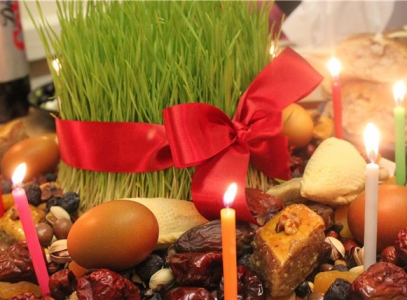Azerbaijanis celebrate Last Tuesday before Novruz Holiday

By Nazrin Gadimova
Azerbaijanis all around the world are looking forward to one of the most beloved and expected holiday: Novruz Bayram, the celebrations of which begin a month before the actual holiday.
Thus, before the main holiday, the four Tuesdays named after elements and called Su Chershenbesi (Water Tuesday), Odlu Chershenbe (Fire Tuesday), Yel Chershenbesi (Wind Tuesday), and Ilakhir Chershenbe or Torpaq Chershenbesi (Earth or Last Tuesday) are celebrated. Water purifies and stirs; fire, soil and wind awaken the nature, and trees begin to blossom. All these symbolize the coming of spring, people have traditionally believed.
Azerbaijan is celebrating the last Tuesday before Novruz - Ilakhir or Torpag Chershenbesi (Last or Earth Tuesday) - on March 18.
Being a symbol of awakening the spring, Last Tuesday means the beginning of field work.
Even in the most ancient times, people identified earth with women, considering it one of the root causes of the world's creation. Expressions such as "mother earth" and "motherland" probably resulted from these beliefs.
The earth is like a nurse to the entire world, and all the creatures of the Almighty, including humans, can find a place there. It feeds humans, and its awakening after a frosty winter means the awakening and rebirth of all living creatures. Celebrating Torpag Chershenbesi, our ancestors paid tribute to mother earth and its riches. A symbol of future fertility was "semeni", which, incidentally, is beginning to grow on the eve of this Tuesday. The procedure for preparing the "semeni" is a complete ritual in itself.
A young girls' favorite tradition in this Tuesday is a "gulag faly" - a divination. According to popular beliefs, you have to make a wish in the evening, and then eavesdrop at someone's door or window, and listen to what the owners are talking about. If you hear good words, it means your dream will come true. Therefore, they say that a lot of nice and pleasant things should be said on this day, because those guests whom you do not even know can hear you, and what you say will be very important to them.
The origins of Novruz Bayramı ("The New Day holiday" in Azeri) stem from ancient Persian culture, signifying the time when the sun enters the Vernal Equniox. The first recording of Novruz comes from a 2 A.D. Persian text, though many historians also believe that Novruz traditions go all the way back to the days of the Achaemenid Empire.
Novruz is popular in Azerbaijan and is considered the most ancient holiday on the Azerbaijani calendar.
Each year, Novruz is celebrated throughout Azerbaijan with special food, extensive spring cleaning, and traditions dating back hundreds of years.
It is traditional to light bonfires on all the four Tuesdays and the eve of Novruz, and jump seven times over one bonfire, or once over 7 bonfires despite one's age and gender. People believe that fire is purifying and takes away all your troubles before the start of the New Year [solar calendar]. Young boys and girls take the ashes of the fire and throw it far from their houses, a gesture that means they're throwing away all the misfortunes of their family with the ashes.
Novruz is a favorite holiday, because the traditional sweets of the Azerbaijani cuisine, such as pakhlava, shakarbura, shorgogal, and badambura, are cooked and served at the festive table every year. Also "govurgha" (toasted wheat) is mixed with nuts (mainly walnuts, hazelnuts, almonds, and chestnuts) and placed on the table along with other sweets.
Happy Chershenbe!
Here we are to serve you with news right now. It does not cost much, but worth your attention.
Choose to support open, independent, quality journalism and subscribe on a monthly basis.
By subscribing to our online newspaper, you can have full digital access to all news, analysis, and much more.
You can also follow AzerNEWS on Twitter @AzerNewsAz or Facebook @AzerNewsNewspaper
Thank you!
